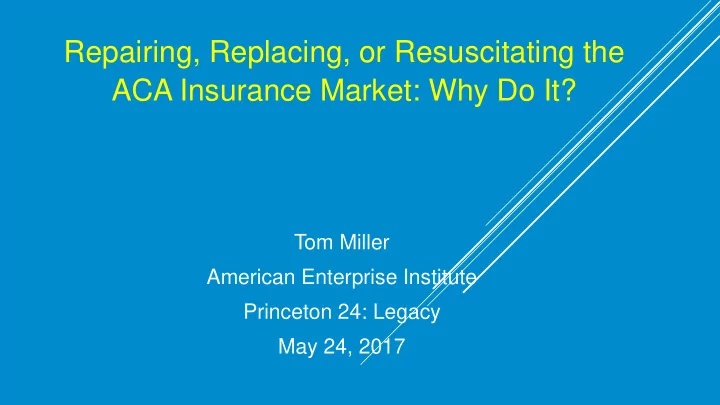

Repairing, Replacing, or Resuscitating the ACA Insurance Market: Why Do It? Tom Miller American Enterprise Institute Princeton 24: Legacy May 24, 2017
Republicans’ Health Policy Film Festival “Gone in 60 Seconds” • “It’s Complicated” • “Weekend at Bernie’s” • “Night of the Living Dead” + “Vampire Diaries” • “It’s Alive” •
Step Therapy for Individual Market
Health Policy: Past Lives Regressions Secure more predictable streams of payment • Capture growing share of economy • Expand third-party payment (other people’s money) • Hide, distort, and suppress real prices • Blame everyone else, sequentially • Take and threaten hostages, as needed • Add, don’t subtract, layers of intervention • Keep incumbents in business • Limit market entry and disruptive competition • Hybrid: profit-side capitalism, loss-side socialism • Invent new names for old policies •
Fictionary • Reconciliation • Fixed dollar, age-adjusted tax credits • Cost sharing • Market discipline
Mining for Cost Savings
Risk Pooling
State Delegation & Innovation: Evolution, not Revolution
Rumbling & Stumbling Consequentialist critiques • Only policy outlines w/o consensus • Path dependence • Opposition vs. governing; theory vs. practice • Insufficient upsides • No unifying, overriding theme(s) •
Rumbling & Stumbling Losing control of the narrative • You play as you practice • Warring minorities • Procedural & timing constraints • Confronting embedded expectations & interests • Loss aversion •
Brezhnev Doctrine of Health Entitlements?
CONTAINMENT?
Misreads: Hits vs. Errors • Subsidies • Regulation/mandates • Taxes • Medicaid • Transition
Moving Beyond A Case of Bipolar Disorders Halt, you can’t do it any different way • Please, just make it all go away •
Was It the Green One? Or the Black One?
Individual Market Hyperbolic Mythology
House Rebounds in Overtime Reversing the blame game • Waivers for wavering members • Desperation, ambiguity, expediency • Beating the shot clock • Survive and advance •
Senate’s Case of First Impression Medicaid • Income & age adjustments to subsidies • Rearranging tax & spending balance • Working the ref • Even tighter margins • Conference vs. take it or leave it •
Looking into Mirror Images Choosing who gets to avoid real prices • Cost sharing is good, but bad • The adversity of selection • Individual mandate is too weak • Cost reduction through lower payments • Single-payer mania • Time inconsistences • The contagions of Baumol’s disease • Insurance myopia •
Scaling Down Ambitions: More Modest, but Real Changes Ahead in Direction & Emphasis Tilt toward more private, less public • Lighten the load (regulation, mandates) • Rearrange/retarget subsidies, winners & losers • Relocate levels of decision making, with accountability • Move on to more important issues •
Ahead? Remarkable redirection • Autoimmune rejection of transplant • Resignation, implicit ratification • More barnacles on the hull •
If You Want Better Answers, Ask Better Questions Who gets to make the initial key decisions in health care? • What do we want health care system to do, & how • do we measure its performance? How do rebalanced health spending commitments match • resources available along with competing needs and preferences? Can we ensure adequate floors without imposing low ceilings ? • How far, and how, should we aim at near-universal coverage? •
If You Want Better Answers, Ask Better Questions How will initial pace and complexity of transition not kill you • first? What’s the better balance between customization and • standardization in health care? How do we produce healthier and wealthier self- • supporting individuals and families through better means and tools? Averaging costs doesn’t reduce them . How can we • improve health care to produce better outcomes at lower all- in costs?
Recommend
More recommend